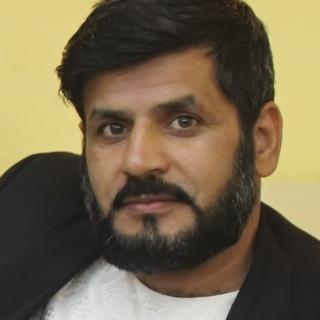Najibullah Sahebzada, who was known as Najib, was born on 1 January 1976 in Balkh Province, northern Afghanistan. He graduated from Istiqlala High School in 1997 and then spent a year working as a steward for Ariana Afghan Airlines. After that, Najib joined the humanitarian organization Action Against Hunger as a hygiene promotion officer in Sancharak district, Sar-e Pul Province (1998–2000).
In 2009 Najib joined a rural business support project, working variously as a guard, driver and purchaser. Three years later – in 2012 – he started work as a field-based consultant for the ICRC’s Mazar-i-Sharif subdelegation. This role evolved into a full-time staff position as an ICRC field-based officer in April 2016. The job entailed supporting the activities of multiple ICRC departments, such as economic security, water and health. Najib spoke Pashto, Dari and English.
With his extensive network of contacts and wide experience, Najib was at ease working among communities affected by conflict and thereby facilitating the ICRC’s work in the field. He knew who to talk to and how to get things done, even in the remotest of places. He was positive, dynamic and calm under pressure – and colleagues were always delighted to have him working alongside them. Having been a consultant with the ICRC for so many years, Najib understood the importance of making the right impression, getting the organization’s message across and listening to people’s needs. As the first point of contact for many communities, Najib was the eyes and ears of the Mazar-i-Sharif subdelegation, gathering information and paving the way for humanitarian activities. He ensured help reached people who needed it most: families displaced or separated by conflict, or simply struggling to make ends meet.
On 8 February 2017, Najib was part of an ICRC convoy delivering livestock feed when it was attacked by unidentified armed men near Sheberghan, Jawzjan Province, northern Afghanistan. Najib, who was 41 and married, was killed along with five other colleagues: Ghulam Murtaza Omar, communications officer; Khalid Jan, economic security field officer; Ghulam Rasoul, driver; Ghulam Maqsoud, driver; and Sayed Shah Agha, driver. During the same incident, two other colleagues were abducted; they were held captive for seven months.
It is one of the worst tragedies in the history of the ICRC.
Speaking after the killings, Director of Operations Dominik Stillhart condemned what he described as a “horrific, senseless act” that had devastated so many lives and shaken the ICRC to its core.
“Alongside the profound sorrow that I feel, I am also filled with anger and outrage that someone would so brutally take the lives of our colleagues – colleagues who were dedicated to helping others. Nothing can justify their murder,” he said.
